01.07.17
Posted in Deception, Europe, Patents at 4:14 pm by Dr. Roy Schestowitz
The EPO‘s Battistelli has lost his main UPC ally in the UK, Lucy Neville-Rolfe
Summary: The issues associated with the UPC, especially in light of ongoing negotiations of Britain’s exit from the EU, remain too big a barrier to any implementation this year (and probably future years too)
THE UPC was a big topic, more so towards the end of last year, especially because of Lucy’s ludicrous statement about it and then her resignation/firing, culminating in yet more uncertainty and a limbo. SUEPO correctly (if not belatedly) took note of top posts in the patent microcosm’s sites. On IAM it wrote: “IAM blog’s top 20 most-read stories of 2016 (IAM Magazine, 22 December 2016). EPO info can be found at reference points 9, 11, 15 and 16.”
“A lot of the above articles are actually not about the EPO directly but about the UPC, which Battistelli keeps promoting.”On Kluwer Patent Blog (Team UPC) SUEPO wrote: “Brexit and EPO unrest in top ten of most popular posts Kluwer Patent Blog in 2016 (Kluwer Patent Blog, 01 January 2017). EPO info can be found at reference points 1, 3, 5, 7 and 10.”
As we noted here a couple of days ago, IP Watch too shared some statistics and noted that articles about the EPO topped their list. A lot of the above articles are actually not about the EPO directly but about the UPC, which Battistelli keeps promoting. Battistelli lies a lot about the UPC. According to what he told the media in 2015 (his so-called ‘media partners’ even printed these lies), the EPO was in great shape and UPC would have been a done deal and ready to roll last year. We recently wrote the following series which explains why, as long as the UK intends to leave the EU, the UPC is basically stuck or deadlocked. Brexit and UPC are inherently incompatible. Revisit the following:
Towards the end of this series we quoted Dr. Luke McDonagh (University of London’s Law School) quite a lot. He is a UPC sceptic in the sense that he does not believe it can happen and next month he will speak about it, debating with/against the patent microcosm. [via]
“Brexit and UPC are inherently incompatible.”McDonagh is not a patent attorney and he is definitely not part of the patent microcosm, so his input on this subject has been refreshing and valuable. We look forward to his talk and maybe even reports about it (probably not only to be covered by the patent microcosm’s sites). From the description of this event: “At this event Dr Luke McDonagh of The City Law School will launch his new book ‘European Patent Litigation in the Shadow of the Unified Patent Court’ (Edward Elgar, 2016) with a panel discussion on the impact of Brexit on patent litigation in the UK and elsewhere in Europe, with a particular focus on the forthcoming Unified Patent Court and future relations between the UK and EU.”
The book’s description can be found here (first chapter free, as mentioned here before) and to quote from the outline: “Making use of evidence from within the business and legal communities, this book highlights the key issues concerning the new system and examines what the impact of the reforms is likely to be on Europe’s patent litigation system in the near future.”
In its current form, the UPC is in impasse/deadlock. It won’t become a reality unless something quite radical happens. █
Permalink
 Send this to a friend
Send this to a friend
01.05.17
Posted in America, Australia, Europe, Patents at 5:27 pm by Dr. Roy Schestowitz
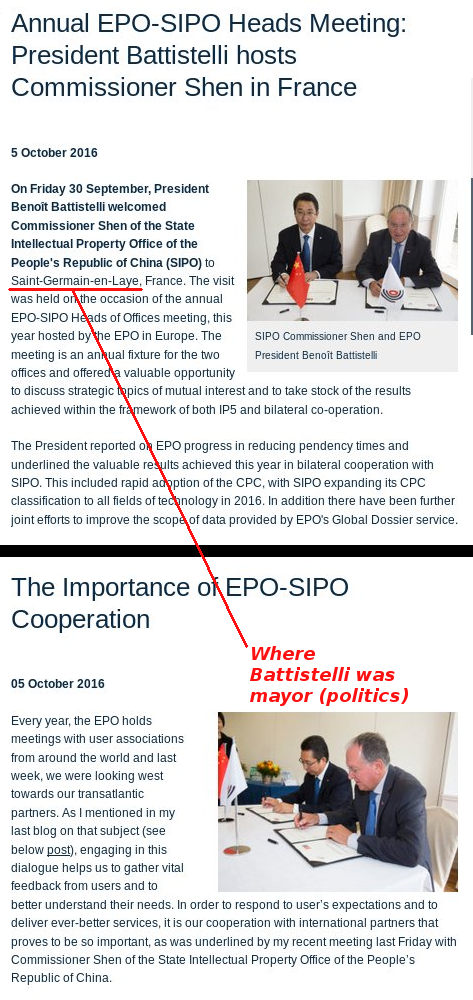
Reference: Loose Patent Scope Becoming a Publicity Nightmare for the EPO and Battistelli Does a China Outreach (Worst/Most Notorious on Patent Quality)
Summary: In defiance of common sense and everything that public officials or academics keep saying (European, Australian, American), China’s SIPO and Europe’s EPO want us to believe that when it comes to patents it’s “the more, the merrier”
RECENTLY, Australia’s Productivity Commission reiterated its opposition to software patents (as before), only to face protests from the patent microcosm (also as before). The report came out so close to Christmas that not many people covered it. During the holiday TechDirt wrote that:
Back in May we were both surprised and delighted by a thorough and detailed report from the Australian Productivity Commission noting that copyright was broken and harming the public, and that it needed to be fixed — with a core focus on adding fair use (which does not exist in Australia). It similarly found major problems with the patent system. It was a pretty amazing document, full of careful, detailed analysis of the problems of both the copyright and patent systems — the kinds of things we discuss all the time around here.
TechDirt focused on copyright aspects of the output from Australia’s Productivity Commission. We already wrote about half a dozen posts about the patent aspects of the Productivity Commission’s report (May and December). The bottom line is, the Productivity Commission basically bemoans both copyright maximalism* and patent maximalism; it specifically chastises software patents. These are seen as detrimental to Australia (rightly so!).
“The bottom line is, the Productivity Commission basically bemoans both copyright maximalism and patent maximalism; it specifically chastises software patents”Look at China for a cautionary tale. It’s quickly becoming a terrible place for inventors and producers to be in. “Patent inventorship has been disputed in several recent cases in China. Wenhui Zhang reviews four court decisions that provide lessons for inventors,” MIP writes. China’s patent office, SIPO, has become the dumpster of rejected patents — the place where one is guaranteed little scrutiny and lots of cheap patents (expensive in a court where the lawyers can make a killing). The EPO is going down the same route under Battistelli, although this transition is a gradual one.
“Right now it’s risky to even look at successful applications because that leads to higher liability/damages in case of infringement.”In a later post we are going to show just how quickly patent trolls are emerging in China as a result of SIPO’s policies. It’s quite incredible, especially in light of the death of patent trolls in the US (due to patent scope restrictions, among other restrictions).
Remember how the patent system was originally, as per the history books, conceived as a way to reward inventors and for publication of inventions? Not anymore. Right now it’s risky to even look at successful applications because that leads to higher liability/damages in case of infringement. And watch what MIP is currently saying about PCT. “For many patent applicants,” it says, “the primary value of the PCT is as a delaying tactic.”
Great for productivity, eh? Not.
“As a reminder, China is now (officially!) perfectly okay even with patents on software and business methods.”“With prosecution costs being a significant contributor to the total price of obtaining patent protection,” MIP says, “applicants are well advised to make strategic decisions early on in the application process to limit costs further down the line. International (PCT) applications are known by many applicants and IP professionals as a convenient delaying tactic when considering jurisdictions in which to file applications following a first filing.”
More than half a decade ago we wrote many articles about the dangerous vision of a global (or globalised) patent system and what it would entail. Now, imagine those million plus patent applications in China (obviously low quality patents) being pointed at every single country/company in the world. As a reminder, China is now (officially!) perfectly okay even with patents on software and business methods. █
________
* The misguided idea that copyright scope, rigidness, lifetime etc. should be maximal if not infinite. This tends to promote centralisation of power/ownership, monopolisation, and harm to culture, curation, preservation, free expression, etc.
Permalink
 Send this to a friend
Send this to a friend
Posted in Europe, Patents at 4:57 pm by Dr. Roy Schestowitz
Applications that belong in the wastebasket are approved to become European Patents

Summary: The problem associated with Battistelli’s strategy of increasing so-called ‘production’ by granting in haste everything on the shelf is quickly being grasped by patent professionals (outside EPO), not just patent examiners (inside EPO)
THE scandals at the EPO have not been abated, but we took a couple of days off and thus weren’t able to cover these.
The European Patent Convention (EPC), as it was put together with a vision almost half a century ago, has been thoroughly compromised. Respect for the EPC came to an end under Battistelli, who treats the EPC like Donald Trump treats the Constitution. Don’t fall for this latest spin from Battistelli’s PR department. Battistelli, a crooked boss with the temper of Donald Trump and the facial expression of Arsène Wenger, has managed to alienate just about any member of staff. He has also alienated patent attorneys and applicants. He’s now living on borrowed time and the longer he stays, the greater damage he causes.
Recently, the EPO’s legal professionals were publicly admitting the mistake of granting patents on things that European authorities explicitly and repeatedly oppose. The EPO belatedly realised that granting patents on life makes everyone angry, including many examiners. George Lucas from Marks & Clerk wrote about it today and another article on this subject was cross-posted in at least three sites of patent lawyers [1, 2, 3]. To quote the key part: “While the U.S. is still sorting out “natural products” jurisprudence under 35 USC § 101, the European Patent Office (EPO) is wrestling with the patentability of plants and animals, and has announced an immediate stay on all patent examination and opposition proceedings in which the outcome “depends entirely on the patentability of a plant or animal obtained by an essentially biological process.” The stay was prompted by a recent Notice from the European Commission (EC) concerning Directive 98/44/EC on the legal protection of biotechnological inventions. In the Notice, the EC concluded that plants or animals derived from essentially biological processes are not patentable under the Directive. Until the EPO provides further guidance on this issue, applicants should exercise additional care in drafting the description and claims for inventions related to plants and animals.”
Yes, now they pay the price for an awful decision made years ago by the EPO.
In the US there are similarly controversial decisions about patents on nature/medicine (Merck). IP Kat has this new article today about “patents covering… claim the use of this dosage regime.” Citing the FDA, IP Watch wrote:
Biotherapeutic medicines are made out of living organisms and cannot be replicated. No generic medicines, which are exact copies of the reference product, can be made. The generic equivalent of a biotherapeutic would be biosimilars, which are highly similar products. The United States Food and Drug Administration has issued a guide to help producers to prove how close their biosimilars are to the biotherapeutics.
Typically the Boards of Appeal (probably the Enlarged one) would weigh in and make sense of it, but Battistelli’s EPO is marginalising these people. Quality control is a nuisance to one who reduces patent quality in order to reach misguided goals. See “EPO Enlarged Board Of Appeal Finds The Cure For Poisonous Divisionals”, published this week in a couple of sites for lawyers.
Citing this paper from 2015, “Comment on Enhancing Patent Quality”, someone from the EPO sphere urged us to consider the importance of patent quality. Brian J. Love from the Santa Clara University School of Law wrote in his abstract: “This Comment responds to the U.S. Patent and Trademark Office’s Request for Comments on Enhancing Patent Quality, published February 5, 2015. It proceeds in two parts. First, I share two general observations about the PTO’s current slate of New Quality Proposals: specifically, it fails to include any reforms that apply post-issue or any reforms that exercise the PTO’s fee-setting authority. Second, building on these observations and two recent empirical studies of mine, I outline two proposals that I urge the PTO to consider: specifically, an increase in maintenance fees and a decrease in fees for post-issue administrative challenges.”
We don’t expect the EPO to learn from the mistakes made by the USPTO in the past (things are improving now). In fact, things keep getting worse as Battistelli drives away a lot of staff and still expects double-digit growth (percent-wise) in the coming (current) year, as measured by the number of patents (or “products”) dealt with.
Kluwer Patent Blog, typically a mouthpiece for the UPC if not the EPO as well, is obviously aware of the EPO crisis because this year’s leading posts, as judged by number of readers, is topped by EPO (specifically the scandals) and UPC. A reader of ours “found this highly interesting post” which resembles what happened in IAM, as mentioned at the time (before Christmas) and to a lesser degree IP Watch.
It sure looks like concern about the direction the EPO has taken, also on purely technical grounds (not labour law but patent quality), is growing. Readers who didn’t read Techrights during the holiday may wish to revisit the leaked letter to Quality Support (DQS) at the European Patent Office. Now compare this to this latest puff piece from today. It says: “Complaints to the European Patent Office (EPO) are dealt with by a central EPO department known as Directorate Quality Support (DQS), which is also solely responsible for drafting and sending the official EPO response to the complainant. The default position is that both the original complaint and the reply thereto issued by DQS on behalf of the EPO are not made public, but rather are kept in the non-public part of the file to which the complaint pertains. This default position was apparently established by a decision of the President of the EPO in 2007. On the face of it, this would not appear to be a particularly contentious position, and is possibly justified given that complaints could be prejudicial to the legitimate personal or economic interests of third parties. Presumably the EPO would rather not place itself in a position of being a public outlet for any such potentially prejudicial remarks.”
As we showed here during the holiday, Directorate Quality Support (DQS) has itself become a shameful failure and utter mess. Applicants who receive such terrible service even resort to complaining to politicians, only to discover that the EPO is immune to prosecution. █
Permalink
 Send this to a friend
Send this to a friend
01.03.17
Posted in America, Asia, Europe, Patents at 10:45 am by Dr. Roy Schestowitz
EPs are becoming ever more useless (hence a waste of money) under Battistelli
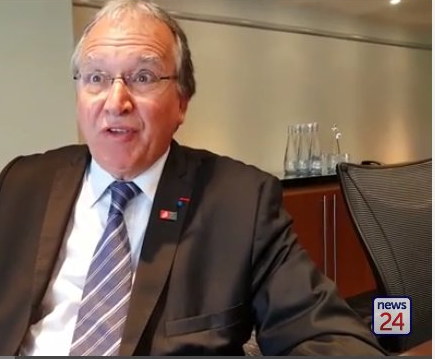
Summary: To nobody’s surprise, the past half a decade saw accelerating demise in quality of European Patents (EPs) and it is the fault of Battistelli’s notorious policies
THE overpaid ‘king’ of the EPO (who keeps the salary he is giving to himself secret, like in a third world country) keeps rewarding himself and his protectors for leading the Office in a self-destructive path — a lethal trajectory that would leave nobody but them (the top-level management) well off financially. The have the economic tenacity of oligarchs that prey on states for profit. They need to be stopped before it’s too late (if it’s not too late already, as redundancies loom over the horizon).
Earlier this afternoon an article from Heise’s Christian Kirsch was published in German. An automated translation of the article tells us it’s much of the old stuff, i.e. not much new information. “Proceedings before the ILO may take up to ten years,” explains Kirsch and also “there are different opinions between the employees and Battistelli about the “improvement in productivity” that he has advanced in the EPO.” To quote the automated and unedited translation: “Visible the first time in 2011. At that time, were the President suggested that the employees from the surplus of the Office a bonus of 4,000 euros net pay. On the other hand, the employees’ representatives expressed their opinion: such a bonus signals that the goal is above all to grant many patents and consequently to generate a high fee. It is, however, essential to examine the applications thoroughly and to maintain the high standard of the EPO in the granting of patents.”
IP Kat‘s debunking of patent quality claims is cited also. To quote: “Auditors and patent attorneys, however, are skeptical about what Battistelli’s “productivity increase” is about, which should have amounted to about 14 percent in 2015. To interpret the figures according to the British Blogs IPKat considers out that the Office has resorted to “cherry-picking”…”
A lot of the rest deals with the spineless [cref 96056& chinchillas] of the Administrative Council, the attack on the independence of the appeal boards, attacks on SUEPO, and at the very end Brexit’s effect on the UPC (the automated translation there is too mangled to be comprehensible).
Looking across the Atlantic at the USPTO, things appear to have meanwhile improved. As Patently-O said after the new year had begun, patents continue to be challenged by PTAB, which is sort of an equivalent of the appeal boards in the EPO (though not exactly similar). One new article says about claims of temporal separation between two communications in a patent that a court stepped in and:
On remand, the PTAB will decide whether the prior art the claim elements as they are more narrowly defined.
Remember that PTAB did not even exist more than half a decade ago!
Battistelli’s vision of the EPO is akin to that of a registration office with minimal appeal opportunities. Because hey, who needs justice anyway? It’s not as though today’s EPO cares about justice. Not even of its own employees…
Another new article of Patently-O says:
The Supreme Court has in recent years routinely rejected the Federal Circuit’s rigid, cabined interpretations of the Patent Act. While no one knows what the future holds, today’s practitioner’s conduct may be judged by a more stringent standard than suggested in Therasense and proposed here. That has happened with eligibility, obviously. Given that the Supreme Court could hold that the Patent Act requires more than avoiding intentionally obtaining a patent that you know you shouldn’t get, and given that that interpretation will likely be applied to all issued patents, and given the USPTO’s statement that it hopes that the new definition will result in less disclosure, one can see a trap for the unwary practitioner. This may give practitioners a false sense of security.
By “practitioners” he means the patent microcosm, or the bunch of people who profit from patent maximalism without actually producing anything (other than paperwork).
And speaking of patent scope, today IAM correctly points out that China has become the land of patent chaos. Patent quality barely exists there and Battistelli seems to be emulating that. He wants a production/assembly line, not a patent office. It’s far too easy to just grant a patent on every piece of garbage and figment of imagination; it’s a lot harder to come up with real inventions and ensure that these — and these alone — get granted a patent, making a European Patent (EP) synonymous with somewhat of a trophy. Here is what IAM (patent maximalists) wrote:
Pro-plaintiff China – Not only does China handle more patent applications than anywhere else on earth, as well as more patent suits, but it is now also becoming one of the world’s most patent-friendly jurisdictions. This was a trend that accelerated during 2016, when it emerged that the Beijing IP court – one of three established in the country in 2014 (the others being in Shanghai and Guangzhou) – had handed foreign rights owners a 100% win rate in its first full year of operation. What’s more, unlike their counterparts in the US, the Chinese courts are willing and able to hand out injunctions, as the likes of Samsung and Apple discovered last year. Not everything in China’s patent garden is rosy – damages are low (though getting higher), enforcement of court decisions is often a problem and there are issues around protectionism – but for a country that has no strong patent tradition, China has come a long way very fast. And with manufacturing jobs moving to lower cost countries, the government’s push for an economy built on innovation is only likely to reinforce this trend. Perhaps the most significant confirmation of what is happening came at the end of the year when it was announced that Qualcomm had settled a high-stakes patent dispute with mobile manufacturer Meizu. This was an American company that had taken action against a flag-waving local business and, in the end, the latter concluded it could not win. That says a lot.
Speaking of China, Tian Lu reviews a book of Qiao Yongzhong. “Many experts in China, including Dr. Qiao,” Lu explains, “feel no smugness with the huge patent filing numbers.”
It’s just a big heap of garbage. The EPO seems to be heading in the same direction, unlike the USPTO, owing in part to SCOTUS with the above-mentioned rulings.
For Europe to be competitive we must ensure that European authorities recognise the colossal damage Battistelli is causing and belatedly step in. █
Permalink
 Send this to a friend
Send this to a friend
Posted in Europe, Patents at 10:00 am by Dr. Roy Schestowitz
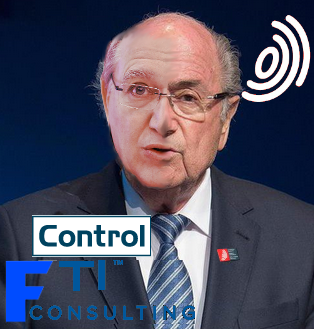
Blatterstelli — as Florian Müller calls him — was already compared to famous criminals on television
Summary: One of the lesser-publicised cases of EPO witch-hunting, wherein a member of staff is denied a salary “without any notification”
JUST over a year ago we started the “Insensitivity at the EPO’s Management” series — a series which dealt with ethical rot at the EPO under Battistelli. The last part dealt more specifically with intolerance of criticism.
“The only ones which are definitely more tragic are those who ended tragically with suicide, I have no doubt to say.”
–AnonymousRecently, someone told me s/he had been mistreated by EPO management, which even stopped paying the salary! S/he “had to conclude that [the] monthly wage has been completely suspended since [...] and that happened without any notification.”
This is like sacking or suspending someone without even telling him/her. It’s arguably worse than the infamous “house ban” of a judge (which was an illegal move, recently followed by halving of the salary). The following is new to us and it shows another dodgy kind of practice at the EPO. We are going to look into it, even if quite gradually in the coming weeks, as we suspect it will be part of a growing problem/pattern.
“The office has been exploiting my health loss and the dramatic situation of a deadly disease in my family.”
–AnonymousA short while ago the EPO promoted Praktika Internships, which we deem a method of giving well-paid examiners some competition to drive them out and/or reduce their salary, pension etc. “This is what you can expect from the Praktika Intern programme,” the EPO wrote, but only ill-informed people would apply for a job at the EPO, where massive layoffs are believed to be on their way.
“I am sure there are some details that I can share with you,” said the person whom we spoke to, “some of which are actually public and not related to my case, yet hidden in the maze of info that the net floods us with every minute.
“It would be also very difficult to summarize facts here. When you will get some of them, events that span many years, but acutely affect me up to a critical point for the last two and a half, I won’t be surprised if you will find my case the worst among the four or five that are now at a critical phase, such as the three suspended staff representatives, the suspended judge. The only ones which are definitely more tragic are those who ended tragically with suicide, I have no doubt to say.
“And later they wonder why people hardly want to work for the EPO anymore?”“The office has been exploiting my health loss and the dramatic situation of a deadly disease in my family. The Office exploited the situation deliberately all the way through, until the final death of my mother, whom I wasn’t allowed to visit, not even in the extreme moments, and further on after such tragic death, by exerting further pressure on me, in spite of my certified illness, also by interfering with the severe mental illness of my father, whom the Office did not restrain from contacting directly, causing unnecessary distress to him, only to check upon me and my whereabouts. I should add that the Office imposed on me a real house arrest, in spite of explicit and urgent recommendations from my doctors against such a pointless measure. I had also to face defamation, fabrication of evidence, the breach of every single rule and procedure that they have thrown at me: disciplinary ones included.”
In the coming weeks we intend to shed more light on what seems to have become a modus operandi inside the EPO. This one case, like previous ones we covered, seems to fit a pattern. By sharing with our readers the hallmark of such attacks on staff we hope to help employees better protect themselves, or at least take/initiate more effective action. And later they wonder why people hardly want to work for the EPO anymore? █
Permalink
 Send this to a friend
Send this to a friend
01.02.17
Posted in Courtroom, Europe, Fraud, Patents at 8:56 am by Dr. Roy Schestowitz
More information to come out soon…
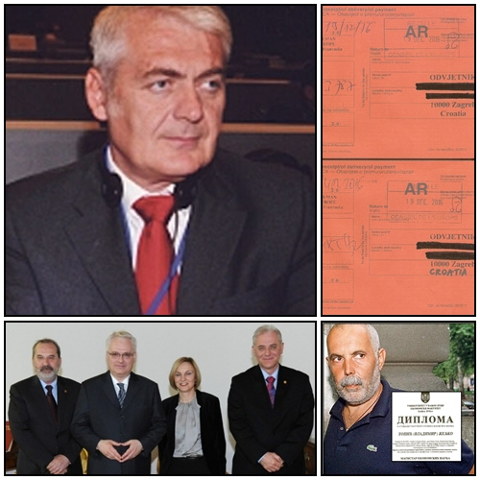
Summary: New trouble for Željko Topić in Strasbourg, making it yet another EPO Vice-President who is on shaky grounds and paving the way to managerial collapse/avalanche at the EPO
PRESIDENTIAL loyalists like Willy Minnoye (Vice-President of the European Patent Office), Ciaran McGinley and Lucy Neville-Rolfe are leaving and the Croatian gravy train (the 'Balkan Express') is close to crashing. We have received the following information from Croatia today. It looks plausible that one EPO Vice-President won’t just retire early but might actually end up behind bars like Ivo Josipović (former President of the Republic of Croatia). In the words of our source:
STRASBOURG – TWO CORRUPTION INDICTMENTS BROUGHT AGAINST ŽELJKO TOPIĆ
On 19 December 2016 the EU Court in Strasbourg received two indictments against Željko Topić, former Director General of the State Intellectual Property Office (SIPO) of the Republic of Croatia in Zagreb and currently the right hand of Benoit Battistelli at the European Patent Office (EPO) in Munich. The indictments include a number of offences in support of corruption committed by Željko Topić as an accountable person during his DG office at the SIPO in Croatia. Namely, due to inefficiency of the Croatian justice and the political protection provided to Željko Topić in the Republic of Croatia, especially by the State Attorney’s Office of the Republic of Croatia (DORH in Croatian) and the Office for the Suppression of Corruption and Organised Crime (USKOK in Croatian), after more than 8 years of investigation, a party to the proceedings made a decision to seek legal protection within the international frameworks at the EU Court in Strasbourg. At any rate, Croatia has not been declared one of the most corrupt countries in the world for no reason according to the latest Corruption Perceptions Index of Transparency International. The most tragic fact in the entire lengthy investigative proceedings in Croatia is that Željko Topić has never been called in for questioning by the police or the State Attorney’s Office. All this time Željko Topić has been receiving his pay from the EPO nonstop in the amount of EUR 18,000.- a month, and the parking space in the EPO car park in Munich has been adorned by his black Mercedes-Benz illegally appropriated from the SIPO in Zagreb, i.e. from the Republic of Croatia. The former President of the Republic of Croatia, Ivo Josipović, is listed as one of the potential political protectors of Mr. Topić. Using a possible criminal offence of influence peddling the former Croatian President has protected Željko Topić from criminal prosecution in investigative structures of the Republic of Croatia for a number of years for one reason only, which reason concerns the operation of the Croatian parafiscal musical association under the name of the Music Authors Rights Protection Office (ZAMP in Croatian). That is to say, by obstructing investigation and protecting Željko Topić the former Croatian President Ivo Josipović in fact has been protecting himself since there is a clear trail of corruption offences leading directly to him over the ZAMP and the SIPO. Moreover, the staffing of the SIPO of the Republic of Croatia is largely comprised of the ZAMP employees having disputable qualifications. The fear that Željko Topić might “squeal on him” during the investigation and the legal proceedings in fashion of the member of the Calabrian mafia has resulted in dropping of criminal charges against him, which in this particular case ended up in Strasbourg. The final act in this judicial play protecting the person and the action of corrupt Željko Topić was performed at the County Court in Zagreb and the Constitutional Court of the Republic of Croatia where the investigations against Topić were declared inadmissible. Therefore, and especially due to the unbearable stench of the judicial marshland, nobody in Croatia was surprised by the most recent statement given to the media by the new Minister of Interior saying that all judges of the Constitutional Court should hand in their resignations on account of corruption since they pose a direct threat to national security of the Republic of Croatia. In addition to the legal proceedings in Strasbourg, the party to the proceedings has also announced criminal prosecution against the leading persons in Croatian justice, and the DORH and the USKOK implicated in protection of Željko Topić. Those charges will also be brought in France, most probably at the Ministry of Justice in Albertville or Grenoble. Specifically, after Croatia joined the EU as a full Member State, the Croatian citizens also have a possibility to take criminal offences to courts beyond the Croatian borders. In conclusion, as learned off the record, there are at least 6 more criminal investigations carried out against Željko Topić in Croatia.
Yes, we already heard about those additional 6 criminal investigations against Željko Topić in Croatia. The man seems to be corrupt enough to match the job requirements of Battistelli and Bergot. And since he is so legally vulnerable they can probably better control him (e.g. by blackmail), too.
We shall post more information about the Strasbourg case in the coming days if not weeks.
The situation at the EPO is getting worse by the day. Published a few days ago by media in Luxembourg (looks like a French and German mix) was an article about the climate at the EPO. The purely automated translation (not edited) says:
The dispute between the President and the Suepo trade union, which represents the bulk of the 7,000-strong workforce, has been raging for more than five years. Minister Etienne Schneider is now responding to a parliamentary question by the LSAP deputies, Claudia Dall’Agnol.
The leadership style of President Benoît Battistelli, who took over this office in 2010, leads from escalation to escalation. Only recently did employees move through the streets of Munich and consulates. According to the statements of the trade unionists, Battistelli has for a long time sprawled the bow so far that the working climate is at its zero point. In the course of this year, three trade unionists from the Suepo were already set before the door. According to our information, the President has indicated very spurious causes of these cancellations, which are not to be attributed to the hair.
Full and accurate translation of the entire article will be appreciated. █
Permalink
 Send this to a friend
Send this to a friend
Posted in Europe, Patents at 2:42 am by Dr. Roy Schestowitz
Like Microsoft ‘studies’ or EPO ‘justice’…
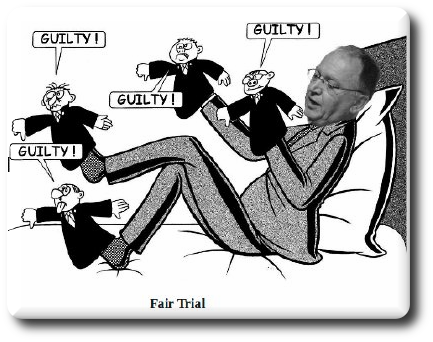
Summary: The sham which is the so-called ‘social’ ‘study’ as explained by the Central Staff Committee last year, well before the results came out
WRITING ABOUT THE Social Study Award Committee, last year the staff representatives at the EPO contacted the Chinchilla Man of the Administrative Council. They tried to make him aware of the fact that the EPO’s ‘social’ ‘study’ would be a sham. And as correctly envisaged at the time, it was indeed a sham ‘study’ produced by a firm of legal bullies, i.e. Battistelli’s kind of fellas’. The outcome of this bogus ‘study’ we covered in the following articles:
It was also around this time, back when we were hit by a lot of DDOS attacks [1, 2, 3], that IP addresses from PwC's network got automatically banned for knocking too hard on our servers. The Central Staff Committee wrote the following letter:
To the Chairman and
the Heads of Delegations
of the Administrative Council
of the European Patent Organisation
Social Study Award Committee
Dear Mr Kongstad,
Ladies and Gentlemen:
The Office, through PD43, has invited the CSC to nominate an observer in the Social Study Award Committee.
We consider this a first, tiny step towards restoring social dialogue. Nevertheless, we would like to draw your attention on a fundamental issue:
How does the Administrative Council (and its Board under Article 28 EPC) intend to ensure that the study is independent and free from possible undue influence from the President?
As mentioned in CA 101/15, the Council has decided to launch an “independent external social study” “in close co-operation with the President”. We would like to stress that the expression “independent external social study” is antithetic with the proposal of it being organised “in close cooperation with the President”. It is difficult to see how the President, who is the one who initiated and carried out all these reforms, should be considered the best and only person to conduct this exercise, which would de facto end in a “self-appraisal”.
If a social study is to be a pillar in the resolution of the on-going conflict, its execution and results must be credible to all stakeholders – staff included. For this purpose, all stakeholders (Administrative Council, EPO Management, staff, trade unions, staff representation) must be involved actively from the earliest stage and throughout the whole process. Accordingly:
- We would expect the Administrative Council (through a subcommittee thereof) to participate in the Award Committee and in the Steering Committee of the Social Study. Moreover, it should be the Council, and not the Office, to be in the “driver’s seat” during this exercise.
- The Staff Representation and the Trade Unions should be actively involved and not merely an observer.
It is wholly inappropriate to involve the staff representation as a mere observer in the Award Committee, and to state – as PD43 did — that the selected contractor would have total independence in carrying out the study following “established international standards”. If the President is the only party giving input to the contractor, in particular drafting the terms of reference and the technical specifications, the social study will be biased already before the actual selection of the contractor. Also, it remains to be seen how the contractor chosen can remain impartial in respect of the Administration who pays the bill, if there are no other supervising entities involved.
We urge you to take seriously these concerns, so as to prevent an expensive and tragic failure of what could be a first step in resolving the current conflict.
Yours sincerely,
The Central Staff Committee
We confirm that the this letter was legitimately decided and produced by the Central Staff Committee1
______
1 Pursuant to Article 35(3) ServRegs, the Central Staff Committee shall consist of ten full and ten alternate members.
The CSC presently consists of 17 members, because two have resigned in Dec 2014 and one has been dismissed in Jan 2016 (against the recommendation of the Disciplinary Committee).
One full member of the CSC has been downgraded in Jan 2016 (against the recommendation of the Disciplinary Committee). In fact, the Office has launched investigations and disciplinary procedures against nearly all SRs, which further caused health problems.
[...]
cc.:
Mr B. Battistelli; The President of the EPO
PD43
“PD43″ (above) is Bergot — the one responsible for spearheading (at Battistelli’s behalf) bogus ‘disciplinary’ proceedings that are actually union-busting endeavors.
Quite a few months have passed since this bogus ‘study’ came out and we rarely hear about it anymore. We hope that delegates are not gullible enough to treat it as anything other than Battistelli propaganda, composed by a rogue firm at his instructions/command. It’s not independent, it’s external only in the payment sense (payments made to the outside), it is antisocial (staff representatives denied participation), and it is definitely not a “study” in any sense other than the political sense. It was another gutter-level low for Battistelli’s regime. It proved that Battistelli was incapable of handling the truth. █
Permalink
 Send this to a friend
Send this to a friend
Posted in Deception, Europe, Patents at 2:20 am by Dr. Roy Schestowitz
European Digital SME Alliance is legitimate (grossroots), not AstroTurfing like Team UPC
 Summary: Another example of UPC promotion from within the EPO (a committee dedicated to UPC promotion), in spite of everything we know about opposition to the UPC from small businesses (not the imaginary ones which Team UPC claims to speak ‘on behalf’ of)
Summary: Another example of UPC promotion from within the EPO (a committee dedicated to UPC promotion), in spite of everything we know about opposition to the UPC from small businesses (not the imaginary ones which Team UPC claims to speak ‘on behalf’ of)
YESTERDAY we wrote about how the Chairman of the Select Committee promoted the UPC based on false claims. It turns out it wasn’t a one-time thing as this document form the Central Staff Committee [PDF] contains yet another example of misleading if not false claims. The transcript in German says: “Es ist mir eine Freude, Ihnen und dem Engeren Ausschuss zum Abschluss der Verhandlungen zum Einheitlichen Patent als Vertreter des Personals gratulieren zu dürfen. Die Patentprüfer, die zukünftig das Einheitliche Patent prüfen werden, sind hervorragend ausgebildete Ingenieure und Naturwissenschaftler. Viele davon sind promoviert und haben respektable Erfahrung in Forschung und Industrie gesammelt. In ihrer Arbeit sehen sich die Kollegen streng dem EPÜ verpflichtet. Und gerade deswegen freuen wir uns, dass die Artikel 142 bis 149 EPÜ nun mit Leben gefüllt werden. Auch die IGEPA hat sich immer für das Einheitliche Patent ausgesprochen.
“It’s unreasonable to expect that an Office which is run by a notorious tyrant can produce something which serves the public rather than Battistelli and his corporate ilk.”“In ihrer täglichen Arbeit leben die Kolleginnen und Kollegen den europäischen Gedanken. Die Wirtschaftslandschaft in Europa ist geprägt durch kleine und mittelständische Unternehmen. Ein starkes und sorgfältig geprüftes Einheitliches Patent kann dazu beitragen, dass nicht nur die Großindustrie, sondern auch die KMUs davon profitieren. Leider müssen wir beobachten, dass für die Arbeit in den dreiköpfigen Prüfungsabteilungen kaum noch Zeit bleibt. Die Effizienzsteigerungen, von denen Ihnen hier regelmäßig berichtet wird, haben eben auch ihre Schattenseiten.
“Allerdings mag es ja durchaus in Ihrem Interesse sein, meine Damen und Herren, die Struktur des europäischen Patentsystems und der Europäischen Patentorganisation anders zu gestalten. Sie haben mit Artikel 172 EPÜ die Möglichkeit, eine Konferenz der Vertragsstaaten einzuberufen. Vielleicht genügt auch schon eine Konferenz der Minister der Vertragsstaaten nach Artikel 4a EPÜ, die eigentlich schon hätte stattfinden müssen, weil sie ja laut EPÜ mindestens alle fünf Jahre stattfinden muss. Ich kann Ihnen versichern, dass die Kolleginnen und Kollegen dann zu dem Erfolg des Einheitlichen Patents beitragen werden und spreche Ihnen abschließend meinen herzlichen Glückwunsch zu dem erreichten Abschluss aus.”
Automated translations of these paragraph suggest that the above admits “the economic landscape in Europe is characterised by small- and medium-sized enterprises. A strong and carefully tested Unitary Patent can help not only the large industry, but also benefit SMEs.”
However, a year later we know that nothing has changed and the UPC would harm everyone but large corporations (some of them foreign) and patent trolls.
If Team Battistelli is so eager to make the UPC a reality in spite of what the European public keeps saying, then it’s clearly an antidemocratic institution whose nature we shall continue to expose. It’s unreasonable to expect that an Office which is run by a notorious tyrant can produce something which serves the public rather than Battistelli and his corporate ilk. There’s an emergent pattern here — one that EPO staff is too familiar with by now. If EPO becomes an instrument of domination or occupation, then it needs to be overhauled, starting from the top. █
Permalink
 Send this to a friend
Send this to a friend
« Previous entries Next Page » Next Page »







 Summary: Another example of UPC promotion from within the EPO (a committee dedicated to UPC promotion), in spite of everything we know about opposition to the UPC from small businesses (not the imaginary ones which Team UPC claims to speak ‘on behalf’ of)
Summary: Another example of UPC promotion from within the EPO (a committee dedicated to UPC promotion), in spite of everything we know about opposition to the UPC from small businesses (not the imaginary ones which Team UPC claims to speak ‘on behalf’ of)















 Content is available under CC-BY-SA
Content is available under CC-BY-SA